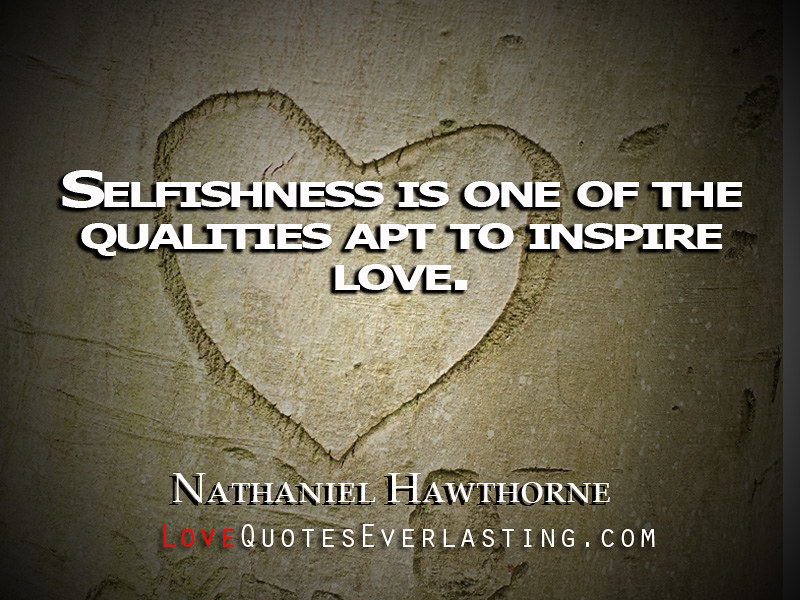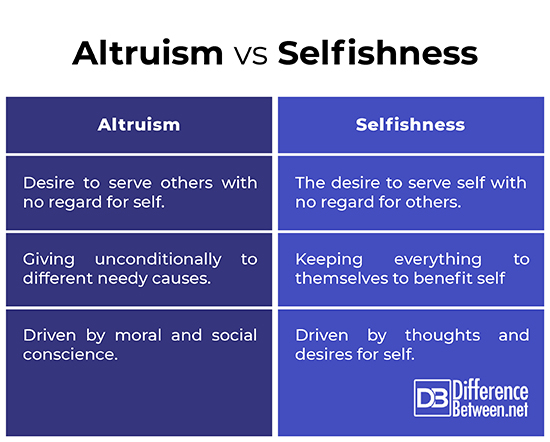Difference Between Altruism and Selfishness
Altruism and selfishness are two characteristics that appear to be opposites and totally different at face value. Altruism is manifested in a desire to serve others without regard for any individual rewards. Selfishness, on the other hand, is the desire to please the individual person indulging in his or her own desires. The selfish person receives their rewards without regard for others. Selfishness is a natural human desire to protect the individual and act in his own interests. In times of need or social unrest the selfish person will strive to protect their own interests and those of their own family group. The emotions attached to this are purely self-focused. The altruistic person gives of their time and talents and material goods without looking for a reward. It appears to be that way but there is a deep emotional benefit to giving. However, the fact that the altruistic person feels huge self-satisfying emotional gain from selfless giving, sheds a different light on this action. It makes the act of being altruistic partly a selfish act of giving to satisfy personal feelings of doing good. Side by side these two words appear to be opposite. Digging a little deeper into the psychology of their meaning reveals an element of selfishness in altruism, making them more alike than one would initially think. The question is are they true opposites or does the altruistic act through the benevolent nature of the act enable some form of selfish feel good emotion to be part of altruism?

What is Altruism ?
Altruism is defined as care and concern for the happiness of others. It is the moral practice of giving unconditionally. Altruism is connected to many religious traditions. The word altruism is derived from the Latin word alteri meaning other people or somebody else. It is the selfless act of giving for no reward. Psychologists argue that true altruism is not a possible human behavior. There will always be personal gratification involved and therefore the altruistic person gets a selfish emotional reward. His emotional ego is gratified.
An act of altruism leaves the giver with a feeling of euphoria. This is often known as a ‘helper’s high’ making kind people happy. There is a circle of kindness and happiness felt through this act of giving. It is said kind people are happy and happy people are kind.
What psychological influences impact on Altruism?
- Empathy:
The person who is able to feel empathy and understand the plight of a needy person is able to understand how the act of giving helps people in under privileged situations. Having a sense of empathy helps a person to be empathetic and recognize the needs in others. They would be ready to unselfishly react and help in some way.
- Benevolence:
The origin of many altruistic acts comes from a desire to act with kindness. The act of giving, with no reward except for being able to give, satisfies a need to be benevolent.
- Sympathy:
Another motivation for altruistic behavior stems from sympathy. Feeling sorry for others who are in a difficult situation evokes feelings of sympathy and a desire to give help to the needy person.
- Sacrificial serving:
Giving does not necessarily revolve around giving materialistically. The altruistic person may be compelled to give their time to charitable organizations to help with various projects without any reward.
- Fear:
The emotion of fear plays a part in being altruistic, especially in religious circles. In these situations, there is a fear of not performing enough good works and these fears may trap people into giving. An altruistic person may give purely because they feel obliged. The demands made by a particular organization may make the altruistic person feel giving is a way to fulfill perceived moral obligations.

What is Selfishness?
Selfishness is the desire to serve self without consideration for others. It is a more natural human behavior because people are more inclined to look after themselves. At first the word selfishness would appear to be the opposite of altruism.
However, there are strong psychological evidences that point to the selfish elements being connected to altruism. Therefore, altruism may not be a true opposite of selfishness. The selfish person lacks consideration for others. This type of person is totally wrapped up in their own needs and wants. Selfishness had benefits to early man and his tribal existence. The act of selfishly providing for his own tribe enabled the tribe to exist in harsh conditions.
In her book, the virtue of Selfishness, Ayn Rand philosopher and author, discusses the fact that “the ultimate moral value, for each human individual, is his or her own wellbeing.” It is this statement that leads her belief that selfishness is a virtue and responsible for man’s protection of himself as an individual.
What psychological influences impact on Selfishness?
- Greed:
Greedy people are generally selfish people. They want everything for themselves and the nature of what they want can vary from materialistic items to time spent with others or power and domination. Greed drives selfish people to desire more.
- Self-preservation:
In times of need a form of selfishness influences the way people behave. What they have they don’t want to share and what they can get they take as much for themselves as possible.
- Insecurity:
Someone who feels insecure does not want to share what they have. They become selfish because they feel if they share what they have they will have nothing for themselves. They believe they will become weaker without all their own things. This includes sharing their ideas and their time with others.
- Self-ambition:
Ambitious people are not keen to share and are overly protective of their ideas and their environment. This is particularly evident in the workplace where ambitious people do not share ideas and successes for fear of someone else taking their ideas and reaping the benefit.
Differences and similarities of Altruism and Selfishness
Emotional:
Both of these actions are charged with feelings of emotion. Selfishness appears to be filled with negative emotions of greed and self-ambition. Altruism appears to be seen in the light of positive emotions, like empathy and benevolence. However, they both share the emotion of fear although in different ways. Selfish people fear having to give away anything they possess while altruistic people fear the possibility of not being generous enough and not fulfilling their desire to help others.
Social:
Socially altruism is very acceptable. People giving unconditionally are seen to be kind and generous as well as loving and giving. However, selfish people are seen to be greedy and uncaring of others. The only time selfishness is condoned is when the act of keeping to ones self is an act of self-preservation for the person and their close family.
Physical:
True altruism should be something that does not get accompanied by loud applause and physical acclamation. Altruism may come in the form of physically helping others and this is part of the act of giving. Selfishness becomes physical when a person deliberately takes something belonging to another and keeps it to themselves.
Psychological:
Both selfishness and altruism drive our psychological motivations. The way we decide to manifest these different approaches to life can be directly related to upbringing and circumstances. A child growing up goes through selfish phases of growth and development. Stable parenting and setting good examples brings out the different sides of this natural personality trait to become either selfish or altruistic.
Altruism Vs. Selfishness

Summary of Altruism and Selfishness:
- It is best to define selfishness and selfish actions as simply belonging to self-gratification. Altruism appears to be the opposite of selfish until the factor of personal pleasure and upliftment from an altruistic act overshadows the perceived motivation of wanting no reward.
- Altruism appears to be part of a higher order of giving in that there is no reward sought after other than doing good. Selfishness is seen as self-centered and not doing good for others.
- The emotions experienced by both these acts of interaction with others differ greatly, except for the emotion of fear. In both cases a person may feel fear of some sort is the motivation to be altruistic or to be selfish.
- Altruistic actions are very giving in every way physically, emotionally, and socially. The selfish person does not give physically, emotionally, and socially. The selfish person takes without giving back.
- Selfish behavior is very one sided. The benefits of any situation are enjoyed by one person only. The actions of an altruistic person are enjoyed by many people depending on the enormity of the giving.
- Difference Between Lagoon and Bay - October 20, 2021
- Difference Between Futurism and Preterism - August 12, 2021
- Difference Between Dichotomy and Paradox - August 7, 2021
Search DifferenceBetween.net :
1 Comment
Leave a Response
References :
[0]Parvez Hanan. www.psychometrics.com. Why are people selfish. October 13th 2014. Pub. Mediavine.
[1]Parvez Hanan. www.psychometrics.com. Why are people selfish. October 13th 2014. Pub. Mediavine.
[2]Koltai Anastasia. Www.myenglishteacher.eu/blog/what is the opposite of selfish. August 12th 2017. pub My English Teacher.
[3]Thater Maximus www.evolutioninstitute.org/one man’s selfishness. Dec.29th 2017 Pub. The Evolution Institute.
[4]Image credit: https://live.staticflickr.com/3826/9451688521_2e3680d0b5_b.jpg
[5]Image credit: https://live.staticflickr.com/3673/9462010382_17fae55849_c.jpg

I believe a selfless person also can be a meglomaniac.Always wanting more not caring how they get it